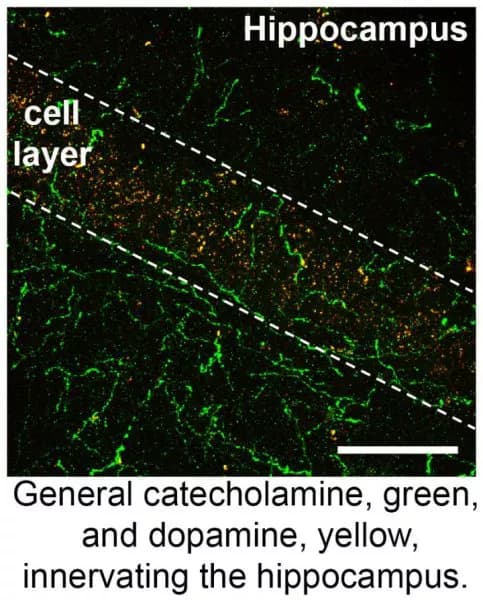
Both Sides Now: Brain Reward Molecule Helps Learning To Avoid Unpleasant Experience, Too
The brain chemical dopamine regulates how mice learn to avoid a disagreeable encounter, according to new research from the Perelman School of Medicine at the University of Pennsylvania. "We know that dopamine reinforces 'rewarding' behaviors, but to our surprise, we have now shown that situations that animals learn to avoid are also regulated by dopamine," said senior author John Dani, PhD, chair of the department of Neuroscience. The team's findings are published this month in Cell Reports.
Special neurons in the brain send out a burst of dopamine in both negative and positive situations. However, the exact way in which dopamine neurons are wired and connected to the brain center called the hippocampus remains controversial among neuroscientists. Knowing exactly how the neurotransmitter dopamine shapes memory and behavior in association with an event or the surrounding environment is important to better understand such conditions as post-traumatic stress syndrome.
"We showed in mice that a special circuit in the hippocampus has flexibility in combining with environmental input to shape behavior during an experiment in which the mice learn to avoid an unpleasant experience," Dani said. "This is the first time that we have been able to show, as proof of principle, that the dopamine circuitry is also involved in learning to avoid aversive situations. "
Prevailing Questions
In previous animal experiments, when mice experience an unexpected reward, for example discovering a tube in which they can obtain a sugar-water treat, a burst of dopamine is emitted in the brain. The debate among neuroscientists centers on whether the neurotransmitter only shapes behavior when an animal is receiving a positive reward or if the neurotransmitter is also involved in shaping the way an animal learns how to avoid an uncomfortable situation.
The team found that if the mice encounter an negative stimuli, a subgroup of neurons fires and releases dopamine in conjunction with the aversive environmental input. They also showed that when the dopamine signal to the hippocampus is chemically blocked in the mice, it prevents them from learning to avoid the negative stimulus. However, if the dopamine signal is chemically boosted in the mice, they remember to avoid the aversive event longer.
"The bottom line of our study is that dopamine plays a role in both conditions, and that dopamine enables mice to learn and remember to avoid the negative situation, in this case avoid a light foot shock in one room of a two-room enclosure."
The above post is reprinted from materials provided by University of Pennsylvania School of Medicine. Note: Materials may be edited for content and length.
Disclaimer: DoveMed is not responsible for the adapted accuracy of news releases posted to DoveMed by contributing universities and institutions.
Primary Resource:
Broussard, J. I., Yang, K., Levine, A. T., Tsetsenis, T., Jenson, D., Cao, F., ... & Dani, J. A. (2016). Dopamine Regulates Aversive Contextual Learning and Associated In Vivo Synaptic Plasticity in the Hippocampus. Cell reports.
Related Articles
Test Your Knowledge
Asked by users
Related Centers
Related Specialties
Related Physicians
Related Procedures
Related Resources
Join DoveHubs
and connect with fellow professionals

0 Comments
Please log in to post a comment.